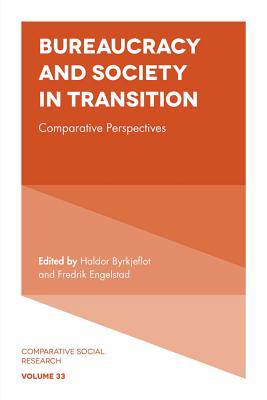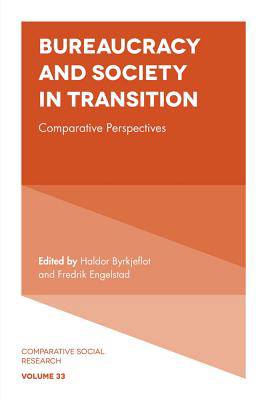
- Afhalen na 1 uur in een winkel met voorraad
- Gratis thuislevering in België vanaf € 30
- Ruim aanbod met 7 miljoen producten
- Afhalen na 1 uur in een winkel met voorraad
- Gratis thuislevering in België vanaf € 30
- Ruim aanbod met 7 miljoen producten
Zoeken
Bureaucracy and Society in Transition
Comparative Perspectives
€ 254,95
+ 509 punten
Omschrijving
New Public Management has held a central position within public administration over the past few decades, complemented by various models promoting post-bureaucratic organization. But 'traditional' bureaucracy has not disappeared, and bureaucracy is in transition in the West and the rest of the world. Bureaucracies still fill crucial positions in modern societies, despite growing criticism of assumed inefficiencies and unlimited growth.
This volume examines a range of issues related to bureaucracies in transition across Europe, with a particular focus on the Nordic region. Chapters examine a range of topics including a reinterpretation of Weber's conception of bureaucracy; the historical development of institutions and organizational structures in Sweden and Greece; the myth of bureaucratic neutrality and the concept of 'competent neutrality'; performance management systems; the anti-bureaucratic identities of senior civil servants; the role of experts and expertise in bureaucratic organizations; the impact of reform on public sector executives; the curbing of corruption in Scandinavian states; an interrogation of the Nordic administrative model; Supreme Audit Institutions; 'street-level' bureaucracy; and the establishment of an 'ethics of office' amongst Danish civil servants.
This volume examines a range of issues related to bureaucracies in transition across Europe, with a particular focus on the Nordic region. Chapters examine a range of topics including a reinterpretation of Weber's conception of bureaucracy; the historical development of institutions and organizational structures in Sweden and Greece; the myth of bureaucratic neutrality and the concept of 'competent neutrality'; performance management systems; the anti-bureaucratic identities of senior civil servants; the role of experts and expertise in bureaucratic organizations; the impact of reform on public sector executives; the curbing of corruption in Scandinavian states; an interrogation of the Nordic administrative model; Supreme Audit Institutions; 'street-level' bureaucracy; and the establishment of an 'ethics of office' amongst Danish civil servants.
Specificaties
Betrokkenen
- Uitgeverij:
Inhoud
- Aantal bladzijden:
- 320
- Taal:
- Engels
- Reeks:
- Reeksnummer:
- nr. 33
Eigenschappen
- Productcode (EAN):
- 9781787432840
- Verschijningsdatum:
- 8/10/2018
- Uitvoering:
- Hardcover
- Formaat:
- Genaaid
- Afmetingen:
- 152 mm x 231 mm
- Gewicht:
- 566 g

Alleen bij Standaard Boekhandel
+ 509 punten op je klantenkaart van Standaard Boekhandel
Beoordelingen
We publiceren alleen reviews die voldoen aan de voorwaarden voor reviews. Bekijk onze voorwaarden voor reviews.






